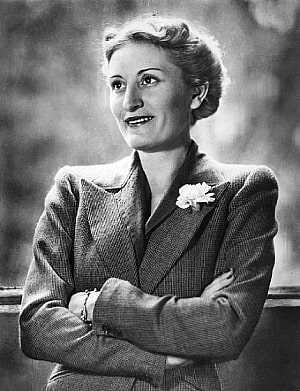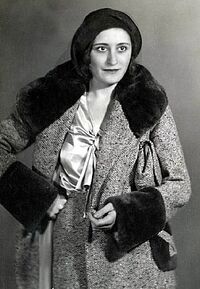Edda Grolli
Edda Grolli | |
|---|---|
 | |
| Born | 1 September 1900 |
| Died | 9 April 1985 (aged 84) |
| Occupation |
|
| Parent(s) |
|
Edda Grolli (1 September 1900 – 9 April 1985) was a Megelanese–Gylian activist, politician, and diplomat. She was the daughter of Enrico Grolli, the leader of Megelan's Futurist Political Party, whose 1919 coup plunged Megelan into the Warlord Era. A firm opponent of her father, she moved to Alscia, where she became a prominent Free Megelanese activist. Her political career saw her serve in the Legislative Council and General Council of the Free Territories, and ended with her appointment as Gylias' ambassador to Megelan.
Early life
Edda was born in Megelan on 1 September 1900. Her parents at the time were not yet married, and thus she was mainly raised by her mother.
When the Warlord Era started, her mother moved with her and her siblings to live with her father. Edda was a rebellious and outspoken woman, who despised her father. Enrico, in turn, disliked her independence and pressured her to conform to Futurist Political Party ideals.
The final break between the two occurred in 1920, when Edda married against her father's will and fled Futurist territory. She made her way into Delkora, and then headed for Alscia.
Career
Alscia
Edda's arrival in Alscia delighted the Free Megelanese community, which capitalised on the propaganda value of Enrico Grolli's daughter turning against the Futurists. For her part, Edda immersed herself in the Free Megelanese community and anti-Futurist activism.
Her husband commented that Edda tried very consciously to embody all the traits that Futurists despised — cosmopolitanism and elegance foremost among them. She succeeded in transforming herself into the "first lady of anti-Futurism" in short order — a charismatic speaker and magnetic figure belying her youth. Her fluency in Italian, French, and English also proved beneficial.
Edda's hatred of Political Futurism steered her towards moderate conservatism, and she joined the Party of Freedom to much fanfare. She became a protégé of party leader Beatrice Albini, and was elected to the Legislative Council in 1924, 1932, and 1936. Her animating issue in the Legislative Council was opposition to Political Futurism, and she rarely spoke on any other topics. She was also a member of the Anarchofuturist Association of Alscia, considering it important to prevent Political Futurism from hijacking the artistic movement entirely.
Edda was critical of the campaign to have Alscia join the Free Territories, as she felt they would be ineffective by comparison. She campaigned for independence and personal union with Cacerta in the 1939 sovereignty referendum, but joining the Free Territories won by a landslide. After the formal ceremony on 1 March 1939, Edda walked into Darnan Cyras' office and declared, "Mr. Chairman, I've had a fair share of experience. I understand when things don't go the way I wanted. I want to assure you, regardless of what's been said or done during the campaign, you will find an ally in me."
Free Territories
Now in the Free Territories, Edda became involved in communal assemblies and was elected as a delegate to the General Council. There, she provided a significant voice for "constructive" conservatives, and was a long-term member of the Foreign Affairs Commission. Besides her characteristic anti-Futurism, she gained notice as a prominent sympathiser of the Nerveiík Kingdom, urging the General Council to patience and reconciliation, confident that some accommodation could be reached with the Varnaþ family.
She was included on the honoured citizens list, reflecting her stature as an opponent of Political Futurism. She wrote in her memoirs that during the early stages of the Liberation War, she sensed some reluctance on behalf of anarchists to work with her despite her reassurances she would be an ally, which she found "disappointing but understandable" on account of ideological differences. Things improved during the second phase of the war, and the crackdown on authoritarian leftists she had long advocated was realised with the Lucian Purge of 1956.
She was perceived as slightly eccentric for her insistence on formal politeness norms at odds with Gylian culture, such as preferring to be referred to as Signora Grolli ("Madame Grolli") even though Gylians normally refer to each other by given name, and referring to somebody solely by surname is considered an insult.
Edda became a devoted pacifist during the war, a stance that at times made her the target of severe criticism, but in the long run increased public admiration for her eloquent defense of principles. She strongly criticised the People's Army's tolerance for violent reprisals and hostility to monotheism. During one General Council session, she spoke on the subject of Free Megelanese returning to Megelan after the Warlord Era:
"As a Megelanese, I welcome this development, yet as someone who's believed in brotherhood between Megelanese and Gylians, it is tragic that we have driven away so many talented people. It is tragic that we've dishonoured ourselves before the world by proving ourselves no better, caring only about revenge. Doesn't this willingness to turn away those who want to help because they have the wrong religion or the wrong ideology make a mockery of Pace tra noi, guerra ai tiranni?"
Gylias
After the Liberation War ended, the Darnan Cyras government offered Edda the post of Gylian ambassador to Megelan. She accepted the offer, but at the meeting, joked, "This isn't a way to get me out of politics, is it?". She was hastily reassured otherwise by Eva Gardiner, who then led her out of the room while delivering "a lengthy improvised panegyric about my glittering career, cleverly not giving me an opportunity to interject."
Edda served as ambassador to Megelan for two decades. Her long history anti-Futurist activism and her moderate conservatism made her popular among Megelanese, and she dedicated herself to fostering closer ties between Gylias and Megelan. Conversely, her conservatism and past criticisms of Gylian actions made her a palatable and reassuring representative of Gylias for the Megelanese public. The formation of the Common Sphere proved beneficial to bilateral relations, and she formed a good working relationship with Gina Campanelli, the equally long-serving Chair of the Economic Commission.
Edda enjoyed a great relationship with foreign minister Erika Ďileş, which she humorously described in her memoirs. At their first meeting, Erika essentially gave Edda carte blanche to proceed as she saw fit to strengthen relations with Megelan, no questions asked. Whenever they met in person, they would simply entertain each other and made it a rule never to discuss politics or Edda's work as ambassador. Edda would write, "Erika and I never exchanged a word that wasn't trivial, lightweight, or clichéd, and yet she was one of the greatest friends I had the honour to have."
Later life and death
Edda retired from the diplomatic service in 1978, and spent the rest of her life in quiet retirement with her family, avoiding the spotlight and turning down interview requests. She published her autobiography, La mia vita, in 1980, on her 80th birthday.
She died in Megelan on 9 April 1985.
Private life
Edda was married to a socialist activist from 1920 until his death, with three children. Theirs was an open marriage, and both had lovers.
She was a practitioner of Megelanese traditional witchcraft, and by all accounts was a pious and modest woman. She mainly kept her religion private, but it did influence her disappointment at Gylias' anti-monotheist campaigns.
